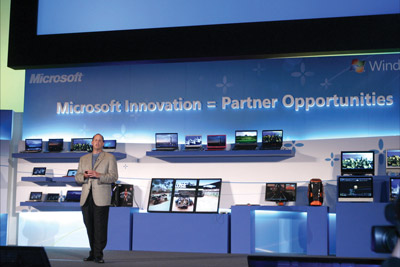News
OEM Chief Makes the Case for Microsoft
Guggenheimer explains why Microsoft still matters in a digital near-future that isn't necessarily PC-centric.
- By Scott Bekker
- July 01, 2010
In the run up to the release of the Apple iPad, there was a debate in the industry about whether people would really buy, use and carry around another device when they already had a smartphone and a laptop, and maybe a desktop PC and a netbook, too.
The rapid sales of 2 million of the iconic Apple devices, while still peanuts compared to the 100 million licenses sold for Windows 7, pretty much settled the question.
Without mentioning Apple, Microsoft senior executive Steve Guggenheimer gave an insightful interpretation of the current device reality that deviates subtly from the old Microsoft line that the PC would be the command center of a digital home and office.
"All of these devices start to share more and more technology over time, but we actually get more and more devices, not less," Guggenheimer said in a keynote address at the Computex convention in Taipei, Taiwan, last month.
Guggenheimer's job is to stand at the intersection of Microsoft, its global hardware partners and money. A 17-year veteran of the company, he is corporate vice president of the Original Equipment Manufacturing Division at Microsoft, overseeing sales, marketing and licensing of pre-installed Windows operating systems on all kinds of hardware. According to Microsoft, about 80 percent of Microsoft client revenue comes through the OEM channel.
At Computex, Guggenheimer made a strong -- but non-combative -- case that Microsoft continues to believe the partner model of Microsoft software and third-party hardware is the best approach to the market, while arguing to the global hardware partners in attendance that Microsoft was moving fast enough toward the cloud and the multidevice future to be worth sticking with.
The case for Microsoft, via Guggenheimer, was that Microsoft still has the platform software to enable hardware makers to build the best devices, and the infrastructure software and cloud services to enable the best ecosystem.
"One of the things that we focus on is ensuring that we build platform software that allows every one of the devices that uses it to run really well," Guggenheimer said from the stage he shared with dozens of devices, predominantly from Asian manufacturers. "That means a phone is a great phone first and then can participate in the ecosystem. A PC is a great PC first and then it can participate. A TV is a great TV first, then it can participate."

"One of the things that we focus on is ensuring that we build platform software that allows every one of the devices that uses it to run really well."
Steve Guggenheimer, Corporate VP, Original Equipment Manufacturing Division, Microsoft
Slates or tablets were missing from that progression, but Guggenheimer got to them and drew an analogy with netbooks, which recently were viewed as a threat to the Microsoft PC OS dominance but now have largely become the low end of the laptop market (and overwhelmingly Windows-based).
"Where [a slate] could be a consumption device, over time we think people will not just want to consume, but also be creative, and maybe be productive. And we've seen this before," he said. "Two years ago when we were here, we had the conversation on netbooks. People said netbooks ... are really just a consumption device. People are just going to want to browse the Web. They're just going to want to do Internet e-mail, but they're not going to want to do anything else."
Indeed, when it comes to slate PCs, Microsoft suffered a setback when Hewlett-Packard Co. recently announced its $1.2 billion deal to acquire Palm Inc. Published reports suggest that in the wake of that deal, the Windows 7 Slate that Microsoft CEO Steve Ballmer showcased at the Consumer Electronics Show in January -- and HP promoted in recent months -- is now on ice. In its place may be a slate device based on the Palm WebOS platform, though HP isn't commenting.
Guggenheimer insists Windows 7 is far from dead as a slate platform, and he showcased two announcements at Computex: Asustek Computer Inc. and Micro-Star International Co. unveiled slate devices based on Windows 7. In an interview, Guggenheimer suggested to RCP that rumors of the HP abandonment of Windows 7 may be exaggerated. Still, it appears that, at least initially, market leaders Dell Inc., HP and Lenovo are going in different directions.
About the Author
Scott Bekker is editor in chief of Redmond Channel Partner magazine.